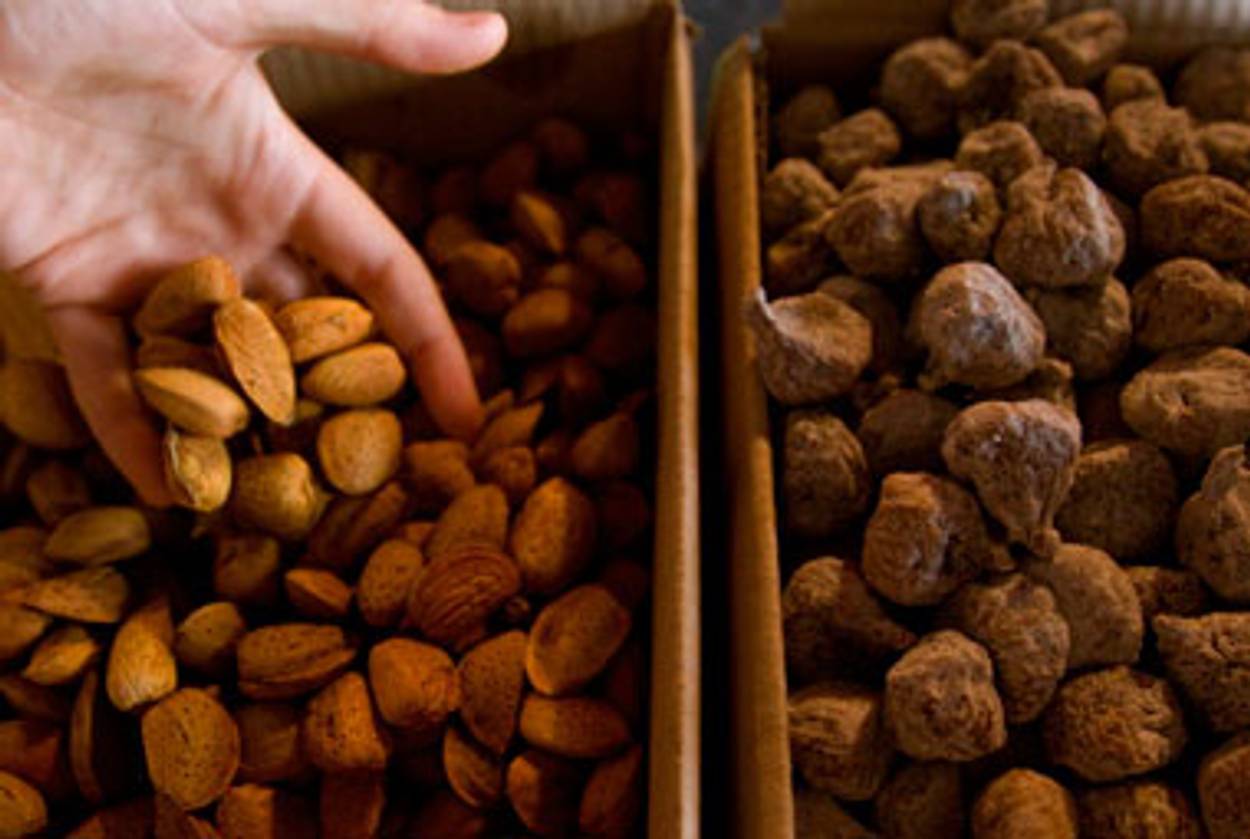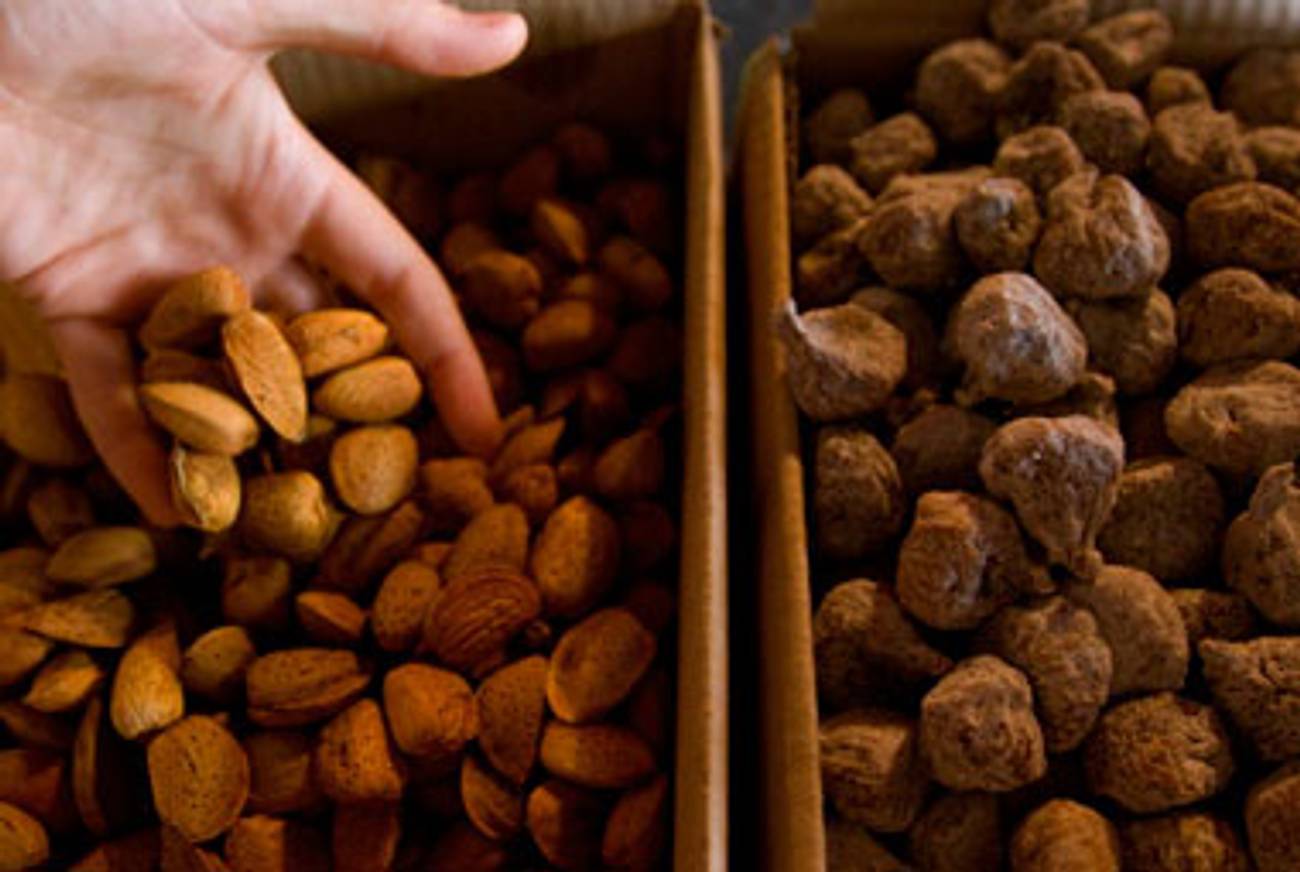Milk, Honey, and Figs
A Jerusalem farmers market brings produce across the Green Line




On the occasional Friday afternoon, a makeshift farmers market appears inside the popular soup shop Marakiya in Jerusalem’s city center. Israelis peruse the goods: dried figs, almonds, creamy labaneh, bottles of grape honey, and briny stuffed olives. It’s a familiar scene in a country known for its fresh produce and sumptuous food markets. But this souk aims to produce more than a good meal.
Behind one of the tables, Yahav Zohar, a 29-year-old tour guide and translator, chats with a customer about a bottle of organic olive oil. While his deep tan and scruffy beard might suggest otherwise, Zohar is not a farmer. Rather, he is something of an altruistic middleman—traveling once a week to the West Bank in search of growers and small-scale food producers whose products he buys and resells at a small markup. “The other day, I bought 500 eggs from a farmer at a shekel apiece,” he said. “In some cases, our purchases end up being a big share of a family’s income.”
Buying locally grown produce has become de rigueur for many food lovers, and in a sense, the Marakiya market is no different from any other sustainable-food venture. The West Bank is densely speckled with agriculture, including vegetable plots, orchards, and olive groves that paint vibrant green brushstrokes across the hilly landscape where sheep and goats graze amongst the scrub. But some of this locavorism is not by choice. No longer able to afford the chemical pesticides and other conveniences used in conventional growing techniques, some Palestinian farmers have reverted to traditional growing methods. According to a recent article in Haaretz, many farmers plant “ancient seeds,” which are indigenous to the region and more resistant to disease than hybrids. They also use “organic compost [made from] goat droppings,” the article reported. Their resulting crops are, by default, sustainable and organic—the kind of produce that makes a foodie swoon. But in Israel, the trendy notion of supporting regional growers is complicated by geopolitics.
“Everything has to go through individual security check points,” Zohar said. Transporting fruits and vegetables becomes “time consuming and expensive, and sometimes things just get stuck,” Zohar explained. “It makes it impossible to make a real business.” As a result, Palestinian-grown produce often fails to make it into shoppers’ hands anywhere in the region. But Israeli citizens can move across the border with relative ease, and food activists who try, under the radar, to move Palestinian-farmed goods outside of the territories sometimes succeed.
The Marakiya market grew out of a community-supported agriculture program called Eco-Baladi, which, starting in late 2007, delivered boxes of vegetables grown in the village of Wadi-Fuqin to customers in West Jerusalem. At its peak, Eco-Baladi supplied produce for 70 households, but was plagued by logistical challenges. “The law around who and what can pass through checkpoints is vague,” Zohar said. “Rules often get decided by the soldiers in the field.” After $1,000-worth of vegetables were confiscated at a security check point, the CSA folded early this year. According to Zohar, Eco-Baladi’s founder had been told she had broken the law by transporting a commercial amount of produce from the West Bank into Israel.
Not long after that, this spring, Zohar and his friend Mohamad, a 36-year-old Palestinian air conditioning and refrigerator repairman from East Jerusalem who requested that his last name be withheld, started the Marakiya farmers market in the soup shop owned by their friends, focusing not on fresh produce but on non-perishable goods that were less conspicuous and less likely to spoil after a long afternoon in a hot truck.
Since its inception in April, the market has met six times. Zohar says that customers, mostly Jews from Jerusalem, have reacted enthusiastically and they soon plan to establish a consistent biweekly schedule that shoppers can count on. For now, they meet whenever time allows and rely on word-of-mouth, email, and Facebook to spread the news about an upcoming market day.
“My biggest hope is to break down the barriers,” Mohamad said. “When I explain to Israelis that these foods come from Palestine and that they were grown with care, I am really explaining how we can benefit and learn from each other.” Still, Zohar and Mohamad are not guided by some disconnected fantasy of peace in the Middle East. Rather, they view their work as a pragmatic step towards reshaping status quo. “We connect producers who are desperate for a market to consumers who are desperate for this type of [organic, specialty] product,” Zohar said. “We are simply doing, on a very small scale, what we think should happen in general.”
Leah Koenig is a freelance writer based in Brooklyn.